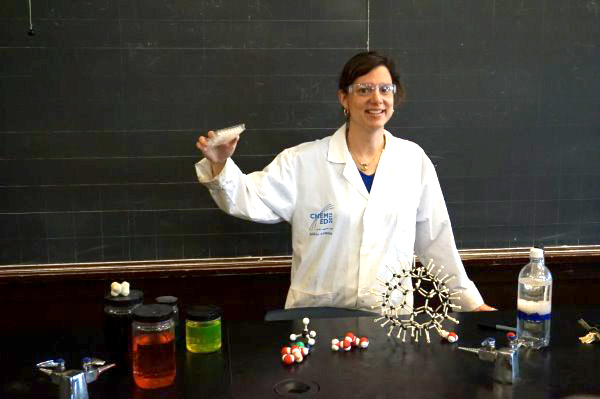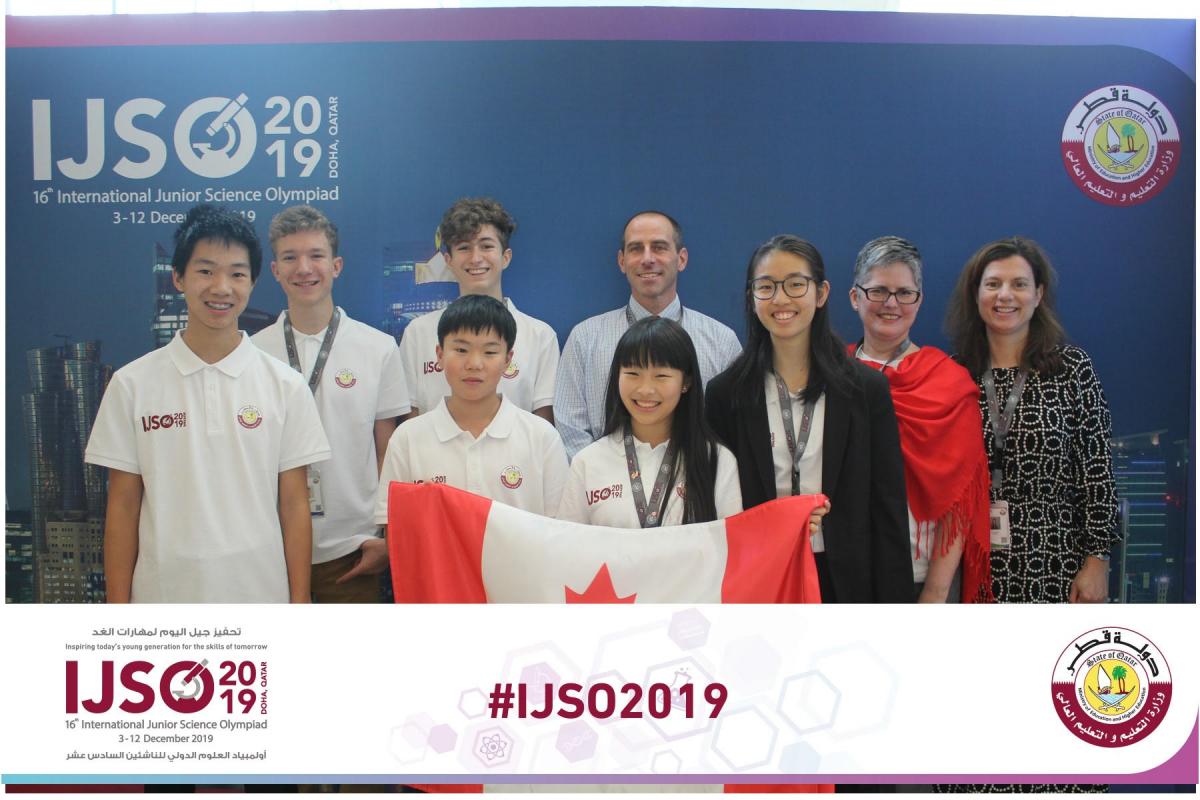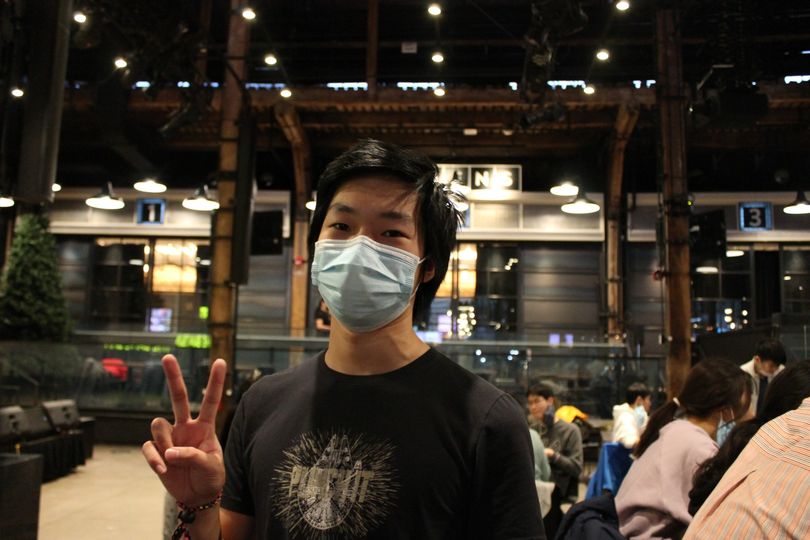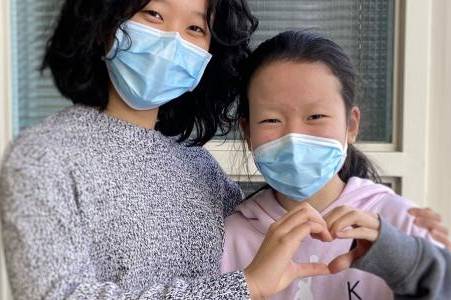371 Bloor Street West
Toronto, ON M5S 2R7 get directions
Toronto, ON M5S 2R7 get directions


S5 (Grade 11) Kat and M3 (Grade 9) Emma will represent Canada virtually at the European Girls Math Olympiad this year, hosted by Hungary.
University of Toronto Schools has a long-standing tradition of prowess at national STEM Olympiad competitions, from the sciences to math to computing science and more, where the highest-ranking students in the country vie for the chance to compete at international Olympiads held around the world. Each year since 2004, at least one UTS student or more made ‘Team Canada’ and competed at the international level. For the last 12 years, UTS math and science teachers have been involved behind the scenes, writing questions and helping create qualifying exams for the National Exams selection processes, as well as developing strong co-curricular programs at UTS where students can explore their passion for STEM and develop skills as Olympiad competitors. The list of accolades received by UTS students could go on, but even though most of the competitions are individual, at UTS Olympiads are increasingly becoming a team sport, where students work together to lift each other up to greater heights in clubs, and where efforts to encourage gender equity are helping to bring more girls into the game.
Kat says she came late to math competitions as a M3 (Grade 9) student. “There were a couple of girls in the grades above me who were so inspiring,” she recalls. “I could just see their passion for math shining through and I wanted to take part.”
Two years later, the S5 (Grade 11) student will represent Canada virtually at the European Girls Math Olympiad, hosted by Hungary, along with M3 (Grade 9) Emma. While the competitions are individual, the two regularly work through problems and practice together as members of the UTS Math Society, where Kat is the Assistant Director of Training. “Girls sometimes have a bond in these underrepresented fields,” she says. “When you meet a girl in math, you almost immediately have an unspoken understanding for each other.”

Jennifer Pitt-Lainsbury, Dean of Academics at UTS
The reality is that women are still not equally represented in STEM fields, whether it be math, engineering, technology or science, and the drop-off begins in elementary and secondary schools.
“We want to create a pipeline for girls that engages and inspires them all the way to post-secondary education and STEM careers,” says Jennifer Pitt-Lainsbury, Dean of Academics at UTS. “Research has shown that female mentorship matters, especially at the elementary and secondary school levels where girls are deciding where their interests lie.”
The Olympiad programs serve to help inspire girls by bringing in real-world applications of science and technology, so it’s not simply theoretical, and the teamwork behind the scenes, which has positive repercussions for girls getting involved in STEM, and has proven effective at UTS.

The first-ever Canadian team at the International Junior Science Olympiad in Qatar in 2019 from left to right: (back row) Alexander, Abe, The Bishop Strachan School's Andrew Moffat, (front row) Daniel, Rally, Emily, Luckya and UTS teachers Dr. Maria Niño-Soto and Jennifer Pitt-Lainsbury. Competing against top science students from 70 other countries, Abe won both the theoretical and overall top score, Daniel won a gold, Emily a silver, and Alexander and Rally each won bronze.
Jennifer knows what it’s like to break barriers as a National Examiner for the Canadian Chemistry Contest and mentor for the Canadian Chemistry Olympiad team. “Often, I’m the only woman in the room,” she says, a situation she is hoping to change.
She’s also the National Coordinator of the Junior Science Olympiad in Canada, an organization she co-launched in 2017 with two female UTS teachers – Physics teacher Marisca Vanderkamp and Biology and Spanish teacher Dr. Maria Niño-Soto, and the full support of UTS Principal Rosemary Evans. It’s all in the spirit of creating a pathway for students, especially girls, to get involved at a younger age.
“It’s definitely an individual competition, but it’s also like teamwork,” says M3 (Grade 9) student Ekaterina, who earned a bronze medal last year at the Junior Science Olympiad of Canada. There was a time when she used to be really competitive and try to do it all on her own, but now realizes how much talking to others helps.
Earlier this year, she took part in a Science Camp in preparation for stage two of the Junior Science Olympiad of Canada. “About 20 of us were solving questions together on Google Meet, bouncing ideas off each other. A good analogy would be cross country running, where you practice as a team, and then in the competition, you run on your own, but it's still a team.”M3 (Grade 9) student Ekaterina
A new organization is in the works at UTS called the STEM Society. In 2020-21, Kat along with Jenny Wu ’21 and Jennifer Zhang ’21 began planning to create this organization, which would serve as an umbrella source of information on the multitude of STEM Olympiad and enrichment opportunities available to UTS students. As well as mentorship and training, it aspires to bring students of all gender identities into the mix and is based on the successes of other STEM clubs like UTS Math Society, and Chem Club. Chem Club first took shape in 2018, when School Captain Aaron Dou ’18 thought it would be good to have a club for chemistry at UTS, in the same way we had Math Club. This school year Chem Club became an official UTS club, under the leadership of S6 (Grade 12) Alexander (sixth in Canada last year at the Chemistry Olympiad National Camp), and supervised by chemistry teacher and UTS Science Department Coordinator Sarah Cescon, who also plays an active role in Canada’s Chemistry Olympiads by writing questions and vetting exams.
 S6 (Grade 12) student Daniel has excelled at creating a supportive environment for fellow students to develop Olympiad prowess,
S6 (Grade 12) student Daniel has excelled at creating a supportive environment for fellow students to develop Olympiad prowess,
as well as earning medals and acclaim in math Olympiads and the Canadian Young Physicists' Tournament and more.
This March Break could be called Math Break for UTS S6 (Grade 12) student Daniel, who competed in a flurry of contests and Olympiads including the Canadian Math Olympiad and the Asian-Pacific Math Olympiad before and during the Break, in hopes of earning a coveted spot on the International Math Olympiad team.
“You might have three questions and four-and-a-half hours to do it, which sounds like a lot of time but it's the limiting factor in those kinds of tournaments,” says Daniel. “The questions are really hard and require a lot of trial and error or just plain ingenuity to solve and that's what makes them fun.”
When he was studying for math competitions as a younger student, he often reached out to older UTS students for help when he needed it. Now, he’s Director of Training in the UTS Math Society, and creating a welcoming environment where UTS students can grapple with the complexities of math together.
Two years ago, the UTS Math Club became the Math Society with a new format: instead of one large group, they created pods of about six to eight students with others at similar levels and abilities to work through math challenges together.
Math and Computer Science teacher Adam Gregson says that while UTS has had several students on the Canadian Math Olympiad Team, the real success is how the Math Society has evolved. “We’ve been trying to make math more social and about getting together with your friends and collaborating,” says Adam. “Now many more students are involved in teaching each other math and working as a team, with a more equal gender balance.”
Math isn’t Daniel’s only Olympiad. In the fall, he took an individual gold and a team gold in the virtual International Olympiad on Astronomy and Astrophysics, hosted by Colombia. He’s also President of the Canadian Young Physicists’ Tournament at UTS, which had an unprecedented showing earlier this month.
“When I first became involved in M3 (Grade 9), there were only one or two girls taking part,” says Daniel. “That evolved this year, where about half the group was girls, and the Power Rangers team was entirely comprised of girls.” Not only that, but UTS had more students taking part than ever before including younger students, and four teams at the national Canadian Young Physicists' Tournament, where Daniel’s Team, Bernoulli, took gold and the three other teams took bronze.
Staff supervisor Marisca Vanderkamp credits Daniel and the other team executives for their exceptional leadership, saying: “They made everybody feel welcome and included, acting as mentors, and that’s part of the reason why the younger girls stayed.”
The competition is really designed to be out of everyone’s comfort zone, she adds, “So it's nice to see some of the girls really feeling comfortable and taking those risks, and realizing that the boys are not in their comfort zone either.”
For M4 (Grade 10) Ali, who came to UTS with Olympiad dreams, it’s been a challenge. The pandemic has stymied Olympiad events with international competitions held virtually or cancelled altogether. Both the International Junior Science Olympiad and Astronomy and Astrophysics Olympiad were supposed to be hosted in Ukraine this year. In 2020-21, the International Junior Science Olympiad in Frankfurt was cancelled because of the pandemic, but this school year Ali made Team Canada and competed virtually from UTS in December 2021 in a hybrid event, hosted by Dubai.
“In the team part of the competition, one person would focus on chemistry, one on biology and one on physics, but there were gaps in our knowledge, so we switched in and out to cover what we didn't know, almost like a machine with all the parts and pieces playing their roles and working together in tandem.”
Ali first became involved because he viewed these competitions as a way to show off his knowledge in his favourite subjects. “But after participating, I realized the actual value of the Olympiad program is the experience of taking part in an intense and interesting competition, with dynamic questions that inspire deeper thinking. The opportunity to learn from these competitions greatly outweighs the actual competition.”
M4 (Grade 10) Ali
